International law and social issues
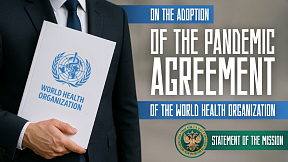
21 мая
•
On the adoption of the WHO Pandemic Agreement
Statement of the Russian Permanent Mission to the UN Office in Geneva on the adoption of the WHO Pandemic Agreement (May 21, 2025)
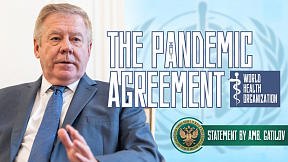
22 апреля
•
Ambassador Gatilov on the WHO Pandemic Agreement
Statement by Russian Permanent Representative to the UN Office in Geneva, Ambassador Gennady Gatilov, in response to a TASS request for comment on the WHO Pandemic Agreement (April 22, 2025)
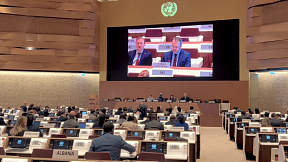
07 апреля
•
Ministerial Segment of the 28th UN Commission on Science and Technology for Development
Statement by Deputy Minister of Science and Higher Education of the Russian Federation, Konstantin Mogilevsky, at the Ministerial Segment of the 28th UN Commission on Science and Technology for Development (April 7, 2025)

02 апреля
•
UNECE Regional Forum on Sustainable Development
Statement by a Russian representative at the High-Level Segment of the UNECE Regional Forum on Sustainable Development (April 2, 2025)

18 февраля
•
“Forming Eurasian security architecture and developing the Eurasian Charter of diversity and multipolarity in the XXI century”
Statement by Russian Permanent Representative to the UN Office in Geneva, Ambassador Gennady Gatilov, at the joint briefing of the permanent representatives of the Russian Federation and the Republic of Belarus on the topic of “Forming Eurasian security architecture and developing the Eurasian Charter on diversity and multipolarity in the XXI century” (February 18, 2025, Geneva)
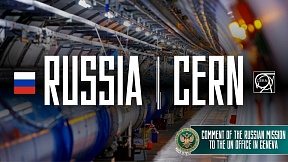
19 марта / 2024
•
STATEMENT on media reports regarding the termination of cooperation between Russia and CERN
Russian Permanent Mission to the UN Office in Geneva in response to a TASS request to comment on media reports regarding the termination of cooperation between Russia and CERN (March 19, 2024)
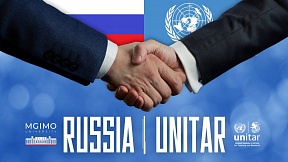
05 марта / 2024
•
RUSSIA-UNITAR
From February 26 to March 1, in Havana, Cuba, joint educational courses were conducted by MGIMO University and the United Nations Institute for Training and Research (UNITAR) for Cuban government officials and master's students from Cuba's Higher Institute of International Relations Raúl Roa García.
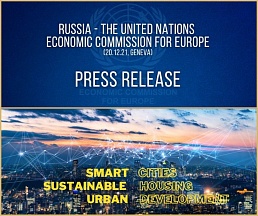
08 февраля / 2022
•
PRESS RELEASE: Russia - UNECE
Russia will assist CIS countries in development of sustainable housing and smart cities
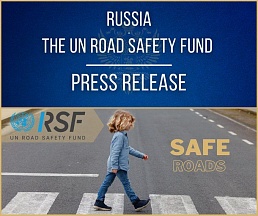
24 января / 2022
•
On Russian voluntary contribution to the budget of the UN Road Safety Fund
The Government of the Russian Federation has decided to allocate a new voluntary contribution of 2 million to the budget of the UN Road Safety Fund.

18 ноября / 2021
•
Statement by the Permanent Representative of the Russian Federation to the UN Office and other International Organizations in Geneva Gennady Gatilov during the Webinar "Democracy and human rights: common goals with diversified approaches"
We have decided to focus today’s discussion on what unites all countries, contrary to the modern discourse based on the assumption that each State must copy a number of so-called “old”, “leading” or “real” democracies or other definitions used by those who identify themselves as a model for the rest of the world.
Building a real democracy is impossible without cultivating respect for human rights and freedoms in society and establishing an effective system for their promotion and protection. By upholding the fundamental principles of liberty, equality and fraternity, democracy creates an enabling environment for individuals to live freely and autonomously. It institutionally guarantees that the policies and laws created by governments take into account the best interests of people who have entrusted their leaders to govern their States. It is a classical form of the social contract which was first described in Greek and Roman philosophy and then transformed by Rousseau and other famous thinkers of the Age of Enlightenment.
Building a real democracy is impossible without cultivating respect for human rights and freedoms in society and establishing an effective system for their promotion and protection. By upholding the fundamental principles of liberty, equality and fraternity, democracy creates an enabling environment for individuals to live freely and autonomously. It institutionally guarantees that the policies and laws created by governments take into account the best interests of people who have entrusted their leaders to govern their States. It is a classical form of the social contract which was first described in Greek and Roman philosophy and then transformed by Rousseau and other famous thinkers of the Age of Enlightenment.
